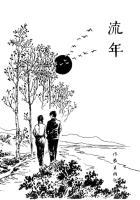“Fool!t'is here that she is to make her apology in her shift!the good God is going to cough Latin in her face!That is always done here, at midday. If 'tis the gallows that you wish, go to the Grève.”
“I will go there, afterwards.”
“Tell me, la Boucanbry?Is it true that she has refused a confessor?”
“It appears so, La Bechaigne.”
“You see what a pagan she is!”
“'Tis the custom, monsieur. The bailiff of the courts is bound to deliver the malefactor ready judged for execution if he be a layman, to the provost of Paris; if a clerk, to the official of the bishopric.”
“Thank you, sir.”
“Oh, God!”said Fleur-de-Lys, “the poor creature!”
This thought filled with sadness the glance which she cast upon the populace. The captain, much more occupied with her than with that pack of the rabble, was amorously rumpling her girdle behind.She turned round, entreating and smiling.
“Please let me alone, Phoebus!If my mother were to return, she would see your hand!”
At that moment, midday rang slowly out from the clock ot Notre-Dame. A murmur of satisfaction broke out in the crowd.The last vibration of the twelfth stroke had hardly died away when all heads surged like the waves beneath a squall, and an immense shout went up from the pavement, the windows, and the roofs,
“There she is!”
Fleur-de-Lys pressed her hands to her eyes, that she might not see.
“Charming girl, ”said Phoebus, “do you wish to withdraw?”
“No, ”she replied; and she opened through curiosity, the eyes which she had closed through fear.
A tumbrel drawn by a stout Norman horse, and all surrounded by cavalry in violet livery with white crosses, had just debouched upon the Place through the Rue Saint-Pierre-aux-Boeufs. The sergeants of the watch were clearing a passage for it through the crowd, by stout blows from their clubs.Beside the cart rode several officers of justice and police, recognizable by their black costume and their awkwardness in the saddle.Master Jacques Charmolue paraded at their head.
In the fatal cart sat a young girl with her arms tied behind her back, and with no priest beside her. She was in her shift; her long black hair fell in disorder upon her half-bared throat and shoulders.
Athwart that waving hair, more glossy than the plumage of a raven, a thick, rough, gray rope was visible, twisted and knotted, chafing her delicate collar-bones and twining round the charming neck of the poor girl, like an earthworm round a flower. Beneath that rope glittered a tiny amulet ornamented with bits of green glass, which had been left to her no doubt, because nothing is refused to those who are about to die.The spectators in the windows could see in the bottom of the cart her naked legs which she strove to hide beneath her, as by a final feminine instinct.At her feet lay a little goat, bound.The condemned girl held together with her teeth her imperfectly fastened shift.One would have said that she suffered still more in her misery from being thus exposed almost naked to the eyes of all.Alas!modesty is not made for such shocks.
“Jesus!”said Fleur-de-Lys hastily to the captain.“Look fair cousin, 'tis that wretched Bohemian with the goat.”
So saying, she turned to Phoebus. His eyes were fixed on the tumbrel.He was very pale.
“What Bohemian with the goat?”he stammered.
“What!”resumed Fleur-de-Lys, “do you not remember?”
Phoebus interrupted her.
“I do not know what you mean.”
He made a step to re-enter the room, but Fleur-de-Lys, whose jealousy, previously so vividly aroused by this same gypsy, had just been re-awakened, Fleur-de-Lys gave him a look full of penetration and distrust. She vaguely recalled at that moment having heard of a captain mixed up in the trial of that witch.
“What is the matter with you?”she said to Phoebus, “one would say, that this woman had disturbed you.”
Phoebus forced a sneer, —
“Me!Not the least in the world!Ah!yes, certainly!”
“Remain, then!”she continued imperiously, “and let us see the end.”
The unlucky captain was obliged to remain.He was somewhat reassured by the fact that the condemned girl never removed her eyes from the bottom of the cart. It was but too surely la Esmeralda.In this last stage of opprobrium and misfortune, she was still beautiful; her great black eyes appeared still larger, because of the emaciation of her cheeks; her pale profile was pure and sublime.She resembled what she had been, in the same degree that a virgin by Masaccio, resembles a virgin of Raphael, —weaker, thinner, more delicate.
Moreover, there was nothing in her which was not shaken in some sort, and which with the exception of her modesty, she did not let go at will, so profoundly had she been broken by stupor and despair. Her body bounded at every jolt of the tumbrel like a dead or broken thing; her gaze was dull and imbecile.A tear was still visible in her eyes, but motionless and frozen, so to speak.
Meanwhile, the lugubrious cavalcade has traversed the crowd amid cries of joy and curious attitudes. But as a faithful historian, we must state that on beholding her so beautiful, so depressed, many were moved with pity, even among the hardest of them.
The tumbrel had entered the Parvis.
It halted before the central portal. The escort ranged themselves in line on both sides.The crowd became silent, and, in the midst of this silence full of anxiety and solemnity, the two leaves of the grand door swung back, as of themselves, on their hinges, which gave a creak like the sound of a fife.Then there became visible in all its length, the deep, gloomy church, hung in black, sparely lighted with a few candles gleaming afar off on the principal altar, opened in the midst of the Place which was dazzling with light, like the mouth of a cavern.At the very extremity, in the gloom of the apse, a gigantic silver cross was visible against a black drapery which hung from the vault to the pavement.The whole nave was deserted.But a few heads of priests could be seen moving confusedly in the distant choir stalls, and, at the moment when the great door opened, there escaped from the church a loud, solemn, and monotonous chanting, which cast over the head of the condemned girl, in gusts, fragments of melancholy psalms, —
“Non timebo millia populi circumdantis me:exsurge, Domine; salvum me fac, Deus!”
“Salvum me fac, Deus, quoniam intraverunt aquoe usque ad animam meam.
“Infixus sum in limo profundi; et non est substantia.”
At the same time, another voice, separate from the choir, intoned upon the steps of the chief altar, this melancholy offertory, —
“Qui verbum meum audit, et credit ei qui misit me, habet vitam
oeternam et in judicium non venit; sed transit a morte im vitam.”
This chant, which a few old men buried in the gloom sang from afar over that beautiful creature, full of youth and life, caressed by the warm air of spring, inundated with sunlight was the mass for the dead.
The people listened devoutly.
The unhappy girl seemed to lose her sight and her consciousness in the obscure interior of the church. Her white lips moved as though in prayer, and the headsman's assistant who approached to assist her to alight from the cart, heard her repeating this word in a low tone, —“Phoebus.”
They untied her hands, made her alight, accompanied by her goat, which had also been unbound, and which bleated with joy at finding itself free:and they made her walk barefoot on the hard pavement to the foot of the steps leading to the door. The rope about her neck trailed behind her.One would have said it was a serpent following her.
Then the chanting in the church ceased. A great golden cross and a row of wax candles began to move through the gloom.The halberds of the motley beadles clanked; and, a few moments later, a long procession of priests in chasubles, and deacons in dalmatics, marched gravely towards the condemned girl, as they drawled their song, spread out before her view and that of the crowd.But her glance rested on the one who marched at the head, immediately after the cross-bearer.
“Oh!”she said in a low voice, and with a shudder, “'tis he again!the priest!”
It was in fact, the archdeacon. On his left he had the sub-chanter, on his right, the chanter, armed with his official wand.He advanced with head thrown back, his eyes fixed and wide open, intoning in a strong voice, —
“De ventre inferi clamavi, et exaudisti vocem meam.
“Et projecisti me in profundum in corde mans, et flumem circumdedit me.”
At the moment when he made his appearance in the full daylight beneath the lofty arched portal, enveloped in an ample cope of silver barred with a black cross, he was so pale that more than one person in the crowd thought that one of the marble bishops who knelt on the sepulchral stones of the choir had risen and was come to receive upon the brink of the tomb, the woman who was about to die.
She, no less pale, no less like a statue, had hardly noticed that they had placed in her hand a heavy, lighted candle of yellow wax; she had not heard the yelping voice of the clerk reading the fatal contents of the apology; when they told her to respond with Amen, she responded Amen. She only recovered life and force when she beheld the priest make a sign to her guards to withdraw, and himself advance alone towards her.
Then she felt her blood boil in her head, and a remnant of indignation flashed up in that soul already benumbed and cold.
The archdeacon approached her slowly; even in that extremity, she beheld him cast an eye sparkling with sensuality, jealousy, and desire, over her exposed form. Then he said aloud, —
“Young girl, have you asked God's pardon for your faults and shortcomings?”
He bent down to her ear, and added:“Will you have me?I can still save you!”
She looked intently at him:“Begone, demon, or I will denounce you!”
He gave vent to a horrible smile:“You will not be believed. You will only add a scandal to a crime.Reply quickly!Will you have me?”
“What have you done with my Phoebus?”
“He is dead!”said the priest.
At that moment the wretched archdeacon raised his head mechanically and beheld at the other end of the Place, in the balcony of the Gondelaurier mansion, the captain standing beside Fleur-de-Lys. He staggered, passed his hand across his eyes, looked again, muttered a curse, and all his features were violently contorted.
“Well, die then!”he hissed between his teeth.“No one shall have you.”Then, raising his hand over the gypsy, he exclaimed in a funereal voice:—“I nunc, anima anceps, et sit tibi Deus misenicors!”
This was the dread formula with which it was the custom to conclude these gloomy ceremonies. It was the signal agreed upon between the priest and the executioner.
The crowd knelt.
“Kyrie eleison, ”said the priests, who had remained beneath the arch of the portal.
“Kyrie eleison, ”repeated the throng in that murmur which runs over all heads, like the waves of a troubled sea.
“Amen, ”said the archdeacon.
He turned his back on the condemned girl, his head sank upon his breast once more, he crossed his hands and rejoined his escort of priests, and a moment later he was seen to disappear, with the cross, the candles, and the copes, beneath the misty arches of the cathedral, and his sonorous voice was extinguished by degrees in the choir, as he chanted this verse of despair, —
“Omnes gurgites tui et fluctus tui super me transierunt.”
At the same time, the intermittent clash of the iron butts of the beadles'halberds, gradually dying away among the columns of the nave, produced the effect of a clock hammer striking the last hour of the condemned.
The doors of Notre-Dame remained open, allowing a view of the empty desolate church, draped in mourning, without candles, and without voices.
The condemned girl remained motionless in her place, waiting to be disposed of. One of the sergeants of police was obliged to notify Master Charmolue of the fact, as the latter, during this entire scene, had been engaged in studying the bas-relief of the grand portal which represents, according to some, the sacrifice of Abraham; according to others, the philosopher's alchemical operation:the sun being figured forth by the angel; the fire, by the fagot; the artisan, by Abraham.
There was considerable difficulty in drawing him away from that contemplation, but at length he turned round; and, at a signal which he gave, two men clad in yellow, the executioner's assistants, approached the gypsy to bind her hands once more.
The unhappy creature, at the moment of mounting once again the fatal cart, and proceeding to her last halting-place, was seized, possibly, with some poignant clinging to life. She raised her dry, red eyes to heaven, to the sun, to the silvery clouds, cut here and there by a blue trapezium or triangle; then she lowered them to objects around her, to the earth, the throng, the houses; all at once, while the yellow man was binding her elbows, she uttered a terrible cry, a cry of joy.Yonder, on that balcony, at the corner of the Place, she had just caught sight of him, of her friend, her lord, Phoebus, the other apparition of her life!
The judge had lied!the priest had lied!it was certainly he, she could not doubt it; he was there, handsome, alive, dressed in his brilliant uniform, his plume on his head, his sword by his side!
“Phoebus!”she cried, “my Phoebus!”
And she tried to stretch towards him arms trembling with love and rapture, but they were bound.
Then she saw the captain frown, a beautiful young girl who was leaning against him gazed at him with disdainful lips and irritated eyes; then Phoebus uttered some words which did not reach her, and both disappeared precipitately behind the window opening upon the balcony, which closed after them.
“Phoebus!”she cried wildly, “can it be you believe it?”A monstrous thought had just presented itself to her. She remembered that she had been condemned to death for murder committed on the person of Phoebus de Chateaupers.
She had borne up until that moment. But this last blow was too harsh.She fell lifeless on the pavement.
“Come, ”said Charmolue, “carry her to the cart, and make an end of it.”
No one had yet observed in the gallery of the statues of the kings, carved directly above the arches of the portal, a strange spectator, who had, up to that time, observed everything with such impassiveness, with a neck so strained, a visage so hideous that, in his motley accoutrement of red and violet, he might have been taken for one of those stone monsters through whose mouths the long gutters of the cathedral have discharged their waters for six hundred years. This spectator had missed nothing that had taken place since midday in front of the portal of Notre-Dame.And at the very beginning he had securely fastened to one of the small columns a large knotted rope, one end of which trailed on the flight of steps below.This being done, he began to look on tranquilly, whistling from time to time when a blackbird flitted past.Suddenly, at the moment when the superintendent's assistants were preparing to execute Charmolue's phlegmatic order, he threw his leg over the balustrade of the gallery, seized the rope with his feet, his knees and his hands; then he was seen to glide down the front, as a drop of rain slips down a window-pane, rush to the two executioners with the swiftness of a cat which has fallen from a roof, knock them down with two enormous fists, pick up the gypsy with one hand, as a child would her doll, and dash back into the church with a single bound, lifting the young girl above his head and crying in a formidable voice, —
“Sanctuary!”
This was done with such rapidity, that had it taken place at night, the whole of it could have been seen in the space of a single flash of lightning.
“Sanctuary!Sanctuary!”repeated the crowd; and the clapping of ten thousand hands made Quasimodo's single eye sparkle with joy and pride.
This shock restored the condemned girl to her senses. She raised her eyelids, looked at Quasimodo, then closed them again suddenly, as though terrified by her deliverer.
Charmolue was stupefied, as well as the executioners and the entire escort. In fact, within the bounds of Notre-Dame, the condemned girl could not be touched.The cathedral was a place of refuge.All temporal jurisdiction expired upon its threshold.
Quasimodo had halted beneath the great portal, his huge feet seemed as solid on the pavement of the church as the heavy Roman pillars.His great, bushy head sat low between his shoulders, like the heads of lions, who also have a mane and no neck.He held the young girl, who was quivering all over, suspended from his horny hands like a white drapery; but he carried her with as much care as though he feared to break her or blight her.One would have said that he felt that she was a delicate, exquisite, precious thing, made for other hands than his.There were moments when he looked as if not daring to touch her, even with his breath.Then, all at once, he would press her forcibly in his arms, against his angular bosom, like his own possession, his treasure, as the mother of that child would have done. His gnome's eye, fastened upon her, inundated her with tenderness, sadness, and pity, and was suddenly raised filled with lightnings.Then the women laughed and wept, the crowd stamped with enthusiasm, for, at that moment Quasimodo had a beauty of his own.He was handsome; he, that orphan, that foundling, that outcast, he felt himself august and strong, he gazed in the face of that society from which he was banished, and in which he had so powerfully intervened, of that human justice from which he had wrenched its prey, of all those tigers whose jaws were forced to remain empty, of those policemen, those judges, those executioners, of all that force of the king which he, the meanest of creatures, had just broken, with the force of God.
And then, it was touching to behold this protection which had fallen from a being so hideous upon a being so unhappy, a creature condemned to death saved by Quasimodo. They were two extremes of natural and social wretchedness, coming into contact and aiding each other.
Meanwhile, after several moments of triumph, Quasimodo had plunged abruptly into the church with his burden. The populace, fond of all prowess, sought him with their eyes, beneath the gloomy nave, regretting that he had so speedily disappeared from their acclamations.All at once, he was seen to re-appear at one of the extremities of the gallery of the kings of France; he traversed it, running like a madman, raising his conquest high in his arms and shouting:“Sanctuary!”The crowd broke forth into fresh applause.The gallery passed, he plunged once more into the interior of the church.A moment later, he re-appeared upon the upper platform, with the gypsy still in his arms, still running madly, still crying, “Sanctuary!”and the throng applauded.Finally, he made his appearance for the third time upon the summit of the tower where hung the great bell; from that point he seemed to be showing to the entire city the girl whom he had saved, and his voice of thunder, that voice which was so rarely heard, and which he never heard himself, repeated thrice with frenzy, even to the clouds:“Sanctuary!Sanctuary!Sanctuary!”
“N?el!N?el!”shouted the populace in its turn; and that immense acclamation flew to astonish the crowd assembled at the Grève on the other bank, and the recluse who was still waiting with her eyes riveted on the gibbet.















